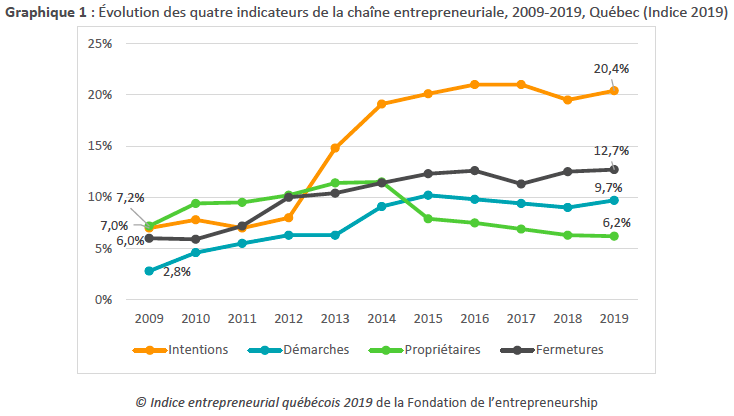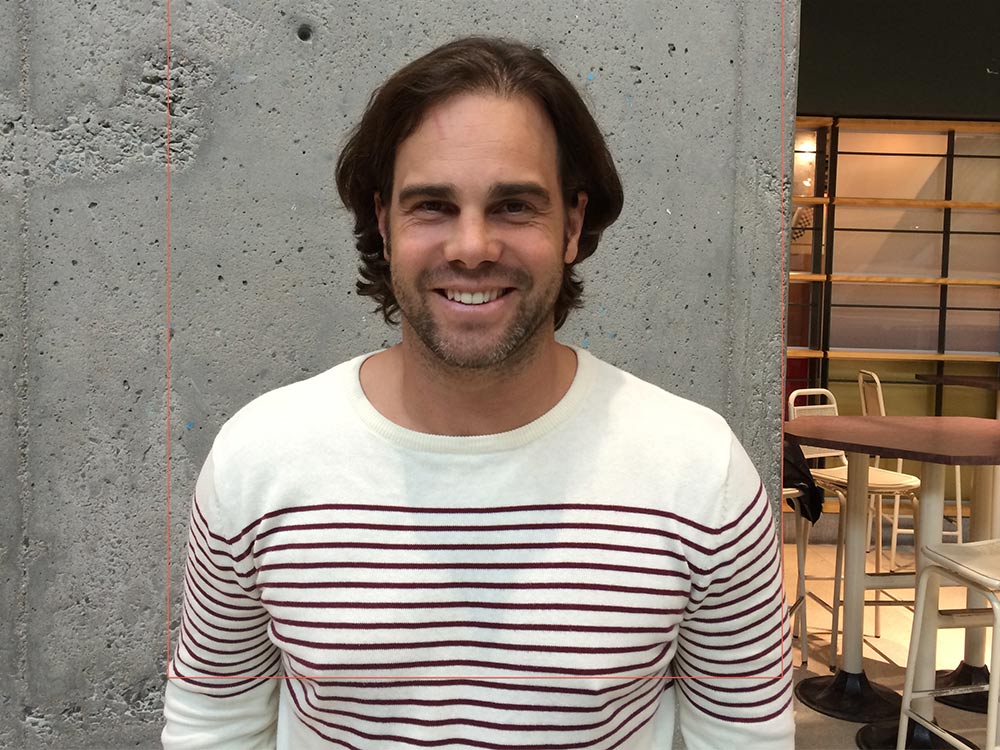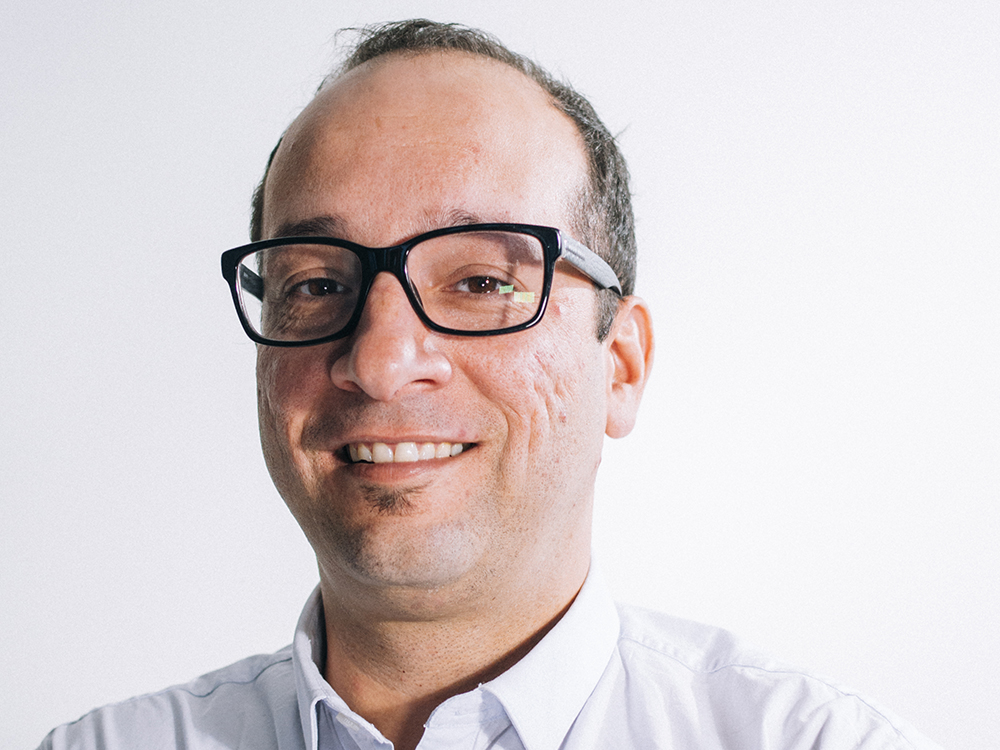
Entrepreneurial Index 2019: Democratized intention
Voir plus loin
According to the study, jointly led by the Fondation de l’entrepreneurship in partnership with the Caisse de dépôt et placement du Québec and Anges Québec, there was still no lack of entrepreneurial dynamism amongst Quebec residents in 2019. But what did become more apparent was an increase in the entrepreneurial intention rate amongst the 35-to-49 group (from 26.2% to 31.8%) and the 50-to-64 group (11.5% to 16.1%), as well as in actual start-ups amongst these groups (with a noted increase from 5.5% to 8% in start-ups amongst 50- to 64-year-olds in 2019).
Starting a business at any age
While the Index has shown for a few years that youth are a very dynamic group all along the entrepreneurial process, some fluctuations in 2019 demonstrate a higher general interest in entrepreneurship for all age groups. “Underneath the apparent stability in growth rates, we note that the perception of entrepreneurship has evolved,” says Rina Marchand. “Today this career is not just accepted, but has become legitimate and desirable. We’d already been saying this for a long time, but now it’s visibly percolating out.”

Following a spike in entrepreneurial intentions in 2016–2017 (21%), the intention rate amongst all groups combined (18–64) had lowered to 19.5% in 2018 before slightly increasing to 20.4% in 2019. A “huge” rate according to Mihai Ibanescu, who emphasizes that even if a significant portion of this interest does not result in launching an actual business, the number is significant enough to inspire economic energy. Plus the diversity in age groups is an interesting aspect in the long term.
“We didn’t expect that those 50 and older, for example, would consider entrepreneurship as their first choice of career. These are people who were raised in another culture. So that’s a shift—surprising in one sense, but interesting!”
Mihai Ibanescu
That was exactly the trajectory of Sylvie Percy, president of electrical solutions provider Besco. After having worked all her life in the electrical sector, Percy felt at the start of her 50s that entrepreneurship would enable her to do what she loved, but in a different way—her own. Thus in 2015 she acquired Fournitures électriques Besco Ltée. This option, which she preferred over launching a business herself, enabled her to take advantage of a foundation and existing client base, as well as certain resources that were already in place. “It was only at that moment that I thought about my age,” confirms the entrepreneur. “The acquisition enabled me to start running a business right away, which I did—I straightened the company out in my first year, changing almost everything!” The electrical solutions specialist jumped into the venture by hiring electrical engineers and technicians so that she could finally offer the highly qualified level of service she had always dreamt of.
Generation X and over
In 2019, Generation X occupied a more prominent place in Quebec’s entrepreneurial ecosystem than it ever had before. Not only did the intention and start-up rate amongst the 35–49 age group exceed those of the 18–34 group for the first time (31.8% compared to 30.8%), but this group was also identified as those most likely to create sustainable businesses. As mentioned in the report, a recent MIT study confirmed that 42 is the average age of American entrepreneurs whose start-ups have strong growth potential.
According to the study, this capacity for creating robust businesses can be partly explained by Gen X’s longer work experience as well as their having generally easier access to resources, both financial and human.
These factors, just like accumulated social and human capital, also lead to the emergence of companies led by people 50 to 64 years of age. The 2019 study even describes this group of “late” entrepreneurs a “new wave.”
In Besco’s case, Sylvie Percy may have pursued her career out of passion, but it was also thanks to a good network of friends she had developed over the years while working in the electrical sector. Her company’s growth had been rapid. In order to cope, the president quickly surrounded herself with family members (eight family members, including the president herself, work at Besco), then launched a second company in 2017, Alain Transport, which enables transportation services to be offered to Besco customers. Besco now includes around fifteen employees and operates throughout Quebec as well as in Africa. Percy, who had completed studies in water purification, also started a third entrepreneurial venture which she found highly stimulating until she was offered the position of president at Triverre, a glass recycling factory.
One thing is for sure: Percy never even thinks about retiring—she loves her life too much and believes in her power to bring change. “Some people don’t like aging, but you should see how much experience comes with age.”
What about the youth?
With an intention rate of 30.8%, young people are still the most dynamic group in Quebec, even though this age segment also includes a certain number of undecideds (22.7% compared to 14.9% in 2018).
As the study highlights, young entrepreneurs who started their companies before the age of 35 are more likely to create large-scale businesses (with more employees), but it’s companies created by entrepreneurs older than 35 that are more likely to last in the long term (to overcome the infamous hurdle of staying in existence for more than five years).
The 2019 Index acknowledges that lack of resources is the main obstacle to moving from intention to action or to actually launching a business (and that obstacle seems to loom even larger for young people in 2019 compared to 2018).
What can be learned from the 2019 Index?
“The main message we want to leave people with is that entrepreneurial culture is still consolidating. It’s a career choice that can really be an option for everyone, even if people get into it with different goals and for different reasons.”
Rina Marchand
Since the study is also about the differences between people who choose entrepreneurship before and after the age of 35, Marchand and Ibanescu find it interesting to note that companies that result from a “young” entrepreneur are more likely to be focused on growth, while companies from a more “mature” entrepreneur are often smaller but more likely to last. It’s just one more bit of evidence that, according to the experts, there’s room for everyone in entrepreneurship.
For her part, Percy sees entrepreneurship as a second youth, and jokes, “I may not be able to say I’m young, but I can say I’m young as an entrepreneur.”
Based on this year’s numbers, Marchant believes it’s important to adequately support all groups in their search for financing and guidance. While there are several existing initiatives to guide and support young entrepreneurs, resources are harder to find for other groups. But since their interest is also strong, it’s important to support these budding businesspeople.
“Entrepreneurship is definitely democratizing,” concludes Marchand. “That’s a positive sign, because it takes a lot of people to ensure vitality. The good news is that we don’t have to rely only on young people to get there.”
TO LEARN MORE:
See the full report on the Entrepreneurial Index website
Indice 2019 was produced by the Fondation de l’entrepreneurship in partnership with the Caisse de dépôt et placement du Québec and Anges Québec.


